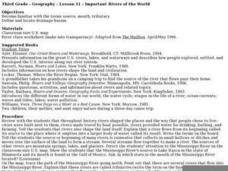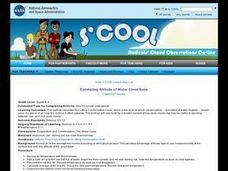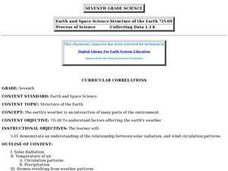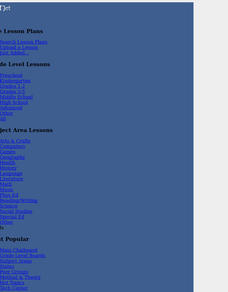Curated OER
How Does Your Garden Grow?
Students create a design for a school garden. In this garden design lesson plan, students analyze what plants grow best in their school's climate and work in teams to design a garden. Students measure the existing space, determine the...
Curated OER
Bell Live! The Great Lakes: A Superior Adventure
Students participate in a virtual field trip to Lake Superior. In groups, they perform experiments in which test the level of toxins and bacteria in the water. They also watch video segments life in the lake and discuss their observations.
Curated OER
Do You See What I See?
Second graders view a teacher-created terrarium, and complete a KWL chart. They discuss what they can see, Students go on a nature walk and compare the schoolyard to the terrarium, discussing the roles of rocks, plants, soil, and water...
Curated OER
Important Rivers of the World
Third graders become familiar with names of the different parts of a river, define and locate drainage basins, locate six of the continents and explore the major rivers on each one, conduct research on a river of their choice.
Curated OER
Marine Communities
Students view a video and then complete lab exercises to help them explain marine communities and animals in them.
Curated OER
Exploring Our Watershed System
Students examine how watershed systems are made up, and visit the Susquehanna watershed system and map out the system. They evaluate the order of watercourses in their area.
Curated OER
Frozen Film
Students are introduced to the topic of light interference through this hands-on activity. They observe how light reflects off two surfaces and then meets to form an interesting variation of color on a film surface.
Curated OER
Estimating Altitude of Water Cloud Base
Young scholars conduct an experiment to determine dew point and use a formula to detemine altitude. They construct a chart and predict what altitude clouds would form, given the dew point on the ground.
Curated OER
Examining Infiltration Rates of Various Soil Types
Students formulate their own hypothesis, determine which variables are important to test their hypothesis, design an experiment in which they collect data. They utilize instruments and tools to measure, calculate, and organize data.
Curated OER
Relative Humidity of Your School
Students predict the location where the relative humidity the highest and lowest in and around their school. They use a sling psychrometer to measure the relative humidity of the various locations.
Curated OER
Planning a Tourist Resort
Students work in teams of 2 to complete the presentation portion of the assignment. They may be required to work alone or may work with their partner to complete the "Board Member's Responses."
Curated OER
Earth's Weather
Seventh graders learn how solar radiation, latitude, and other factors affect weather. They break into six groups and are assigned a topic to research and to present their findings orally.
Curated OER
Super Scientists Code
In this science learning exercise, students use the key code on the right to unscramble each of the scientists. They also match each of the scientists found to their correct description.
Curated OER
Dateline: El Niño
Students explore El Nino and take the role of a reporter gathering the facts for a news story. Reports are presented orally, like a newscast, written or in whatever form the teacher prefers.
Curated OER
Clouds
Students study how to use the Internet as a static information collection tool, to enhance the literature stories on the weather and study how to use the calculator.
Curated OER
DAY AND NIGHT
Students use a lamp as the sun and his/her body as the earth. They rotate in different directions to explain how the earth moves around the sun. Using specific questions in their discussion, students discover the reasons for day and night.
Curated OER
Writing a Short Story - Weather
Learners use the information they wrote about on the topic they chose in studying About Weather. They then write a short story using the information choosing a theme, setting, characters, and the plot.
Curated OER
Learning About Weather
Students decide what type of weather they would like to write about such as tornadoes, hurricanes, snow, hail, floods, or another type of weather.
Then, they look up the information and jot down notes about that particular subject....
Curated OER
Dinosaurs-Eoraptor
Students explore the Eoraptor. In this dinosaurs lesson, students read facts about the habitat and eating habits of the Eoraptor and illustrate a picture of the dinosaur.
Curated OER
The Month of April-Writing Prompts
In this writing prompt worksheet, students complete a writing prompt for each day in April. Worksheet is a series of prompts, 3 per page. A reference web site is given for additional activities.
NASA
Nasa: Goddard Space Flight Center: Precipitation Education: The Water Cycle
This learning tool from NASA provides educational tools related to precipitation. The water cycle is featured on this portion of the site.
Chase Young, PhD
Dr. Chase Young, Ph D: Reader's Theater Script: The Water Cycle [Pdf]
A reader's theater script for "The Water Cycle" is provided on this site. Nineteen speaking roles are needed in this script.
US Geological Survey
U.s. Geological Survey: What Is the Water Cycle?
A quick summary of the water cycle that includes a diagram of the cycle, with links to in-depth explanations of each component of the cycle. Click "water-cycle home" to access water-cycle resources in a variety of languages.
US Geological Survey
Usgs: Water Cycle for Schools
The U.S. Geological Survey (USGS) and the Food and Agriculture Organization of the United Nations (FAO) have teamed up to create a water-cycle diagram for schools. Use the interactive version and download printable files of the diagram.
Other popular searches
- Water Cycle Diagram
- The Water Cycle
- Water Cycle Experiment
- Water Cycle Activities
- Water Cycle Stages
- Water Cycle Crossword
- Water Cycle Lesson Plans
- Water Cycle Reader's Theater
- Water Cycle and Evaporation
- Water Cycle Diagram Label
- Water Cycle Simulation
- Build Your Own Water Cycle























![Dr. Chase Young, Ph D: Reader's Theater Script: The Water Cycle [Pdf] Activity Dr. Chase Young, Ph D: Reader's Theater Script: The Water Cycle [Pdf] Activity](https://d15y2dacu3jp90.cloudfront.net/images/attachment_defaults/resource/large/FPO-knovation.png)
